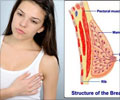According to a study, a reminder program aimed at screening for breast cancer when it is most treatable boosted mammography rates by more than 17 percentage points.
According to a study, a reminder program aimed at screening for breast cancer when it is most treatable boosted mammography rates by more than 17 percentage points.
The new study was given by Kaiser Permanente's Center for Health Research in the August issue of the American Journal of Preventive Medicine. The program used electronic health records to identify women who would soon be due for a mammogram and reached out to them via postcards, automated voice messages and personal phone calls.The study of 35,000 Kaiser Permanente members is the largest to test a reminder program involving this three-pronged approach. By the second year of the program in 2008, mammography rates jumped from 63 to more than 80 percent among women aged 50-69.
"We know mammograms are effective, but too many women put them off, even when they have health insurance," said lead author Adrianne Feldstein, MD, MS, an investigator at Kaiser Permanente's Center for Health Research in Portland, Ore., and a practicing physician. "This study is the first to show that these reminder programs can be effective in such a large group of women. If we could improve the country's mammography rate by the same amount, we could detect as many as 25,000 additional cases of breast cancer each year."
"Our study shows that a reminder program can spark a big improvement in a short amount of time," said study co-author Nancy Perrin, Ph.D., senior investigator at Kaiser Permanente's Center for Health Research in Portland, Ore. "Automated reminder programs make it more convenient for people to focus on staying healthy by getting the screenings they need."
Breast cancer is the most common cancer among women in the United States, with one in eight developing breast cancer and 46,000 dying from it annually. Although regular mammograms can reduce breast cancer deaths by more than 30 percent and the U.S. Preventive Services Task Force recommends screenings every 1-2 years for women over age 40, current screening rates fall short of these guidelines.
The study is part of Kaiser Permanente's ongoing effort to encourage preventive health through diligent cancer screenings. Nationwide, Kaiser Permanente has an array of services designed to ensure screening for breast cancer, ranging from mobile screening vans, breast health fairs, to built-in prompts in its electronic health records system, KP HealthConnect, the world's largest civilian electronic health record.
Advertisement
While previous trials have examined the effectiveness of mammogram reminder programs, few have addressed implementation and maintenance of these programs. This trial is noteworthy because of its size most previous trials involved fewer than 1,000 women and because it incorporated automated calls; most of the previous research had focused only on mail and live telephone counseling reminders.
Advertisement
Source-Eurekalert
ARU











